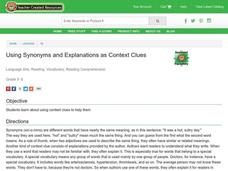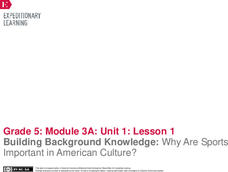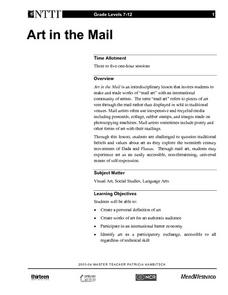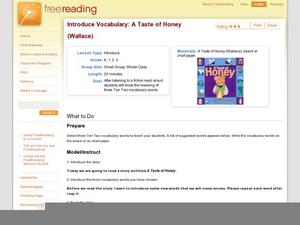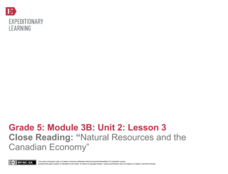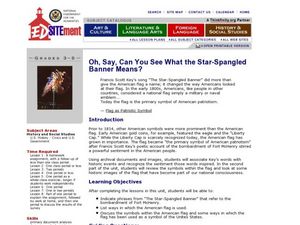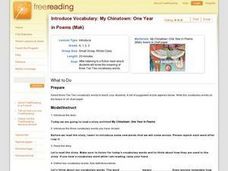Curated OER
Sequence, Predict, Infer: Pink and Say
Practice sequencing with your 2nd graders via Patricia Polacco's Civil War book Pink and Say. Begin with a blindfold and a bag of mystery items. Connect their use of clues to identify what they can't see with the skill of making...
Curated OER
Using Synonyms and Explanations as Context Clues
How can context clues help your young readers understand material better? Focusing on synonyms and explanations as ways to determine word meaning, this activity encourages your class to find context clues within a sentence. An attached...
Curated OER
Practicing Sight words
Review sight words with readers. They will look over their sight words and come up with sentences for each of them. They also review the alphabet and identify unfamiliar words.
National Endowment for the Humanities
Courage “In the Time of the Butterflies”: A Common Core Exemplar
The courage of Las Mariposas, the Mirabal sisters, is the focus of a series of activities designed to accompany a reading of In the Time of the Butterflies that ask readers to consider what it means to be courageous. Beautifully crafted...
Curated OER
Quick and Sticky Context Clues
Discuss strategies for defining word your young readers don't know. They read sentences with key words covered by sticky notes and guess from the context what the word might be. They peek at the first letter and guess again.
EngageNY
Paragraph Writing: The Role of Religion in Colonial America
Informative writing is emphasized in the standards. Help your learners reach that goal with the plan for paragraph writing outlined here. After reviewing the work from the day before and adding to their vocabulary notebooks, class...
EngageNY
Main Ideas in Informational Text: Analyzing a Firsthand Human Rights Account
Although this is part of a series, lesson plan nine has your class take a break from their close study of the Universal Declaration of Human Rights (UDHR) text to read the firsthand account “Teaching Nepalis to Read, Plant, and Vote” by...
Hyperion Publishing
Words We Live By: Your Annotated Guide to the Constitution
The language of the Constitution can feel quite ominous to young learners, but there are a variety of strategies you can utilize to help your class grasp the important concepts and ideals in our nation's founding document. This lesson...
EngageNY
Building Background Knowledge: Why Are Sports Important in American Culture?
What makes sports so special to many Americans? Scholars ponder the question as they participate in a gallery walk, immersing themselves in images and texts about sports. Pupils also complete a vocabulary strategies anchor chart to...
Curated OER
Art in the Mail
The "mail art" phenomena was started back in the 20's with the Dada and Fluxus art movements and revitalized in the 60's. The principle of mail art, is free exchange and artistic expression. Learners study these facts and then create...
EngageNY
Building Background Knowledge: Vietnam as a “Battleground in a Larger Struggle”
Read. Stop. Think. Scholars use a reading strategy to process the challenging text, "The Vietnam Wars." They read a paragraph and then stop to think about the text and its meaning. Readers then go on to work with partners and make notes...
Curated OER
Alexander Hamilton and the Roots of Federalism
Explore the origin of political parties in the United States. Learners work in groups to read and analyze copies of the "Report on Manufactures" written by Alexander Hamilton. Then, they complete a worksheet comparing the Federalists to...
Curated OER
Etymology
Learners dissect and build words from parts like prefixes, base words, suffixes, and inflectional endings. Etymology skills help us find the meanings of words by identifying the different parts that constitute them. Class members use...
Curated OER
Introduce Vocabulary: I Hate To Be Sick
Engaged in a read aloud, kids use the story to define new vocabulary words, raising their hands when they hear new words in the story. Additionally, individuals refer to the text to show how the word was used in context. Vocabulary words...
Curated OER
Introduce Vocabulary: A Taste of Honey (Wallace)
A Taste of Honey offers learners a chance to practice with unknown words and context clues. Choose several vocabulary words to focus on as you read the picture book, or use the ones provided here. Pre-teach the words and have scholars...
Curated OER
Prefixes
Learners explore prefixes, and how they help us decipher unknown words. Decode and define the meaning of boldface words with prefixes used in context on a classroom chart. Writers complete a worksheet practicing the same skill.
Curated OER
Vocabulary: Make Connections with New Vocabulary
The story Hansel and Gretel is used to build new vocabulary in context. The class reads the story together. They then focus on 2-3 new vocabulary words, using the context of the story to help define them. This lesson is fully scripted...
Curated OER
Dictionary
Discovering different ways to use a dictionary to find the meaning of unknown words is the focus of this language arts lesson. Everyone reads a story and practices finding unknown words in the dictionary.
Achieve3000
Context Clues and Idioms
Kids practice using five types of context clues (definition, synonym, antonym, example, and general) to decode idiomatic language.
Illinois Mathematics and Science Academy
A Search for Symbolism in The Great Gatsby
After reading The Great Gatsby, groups return to the text and note passages where Fitzgerald uses symbols and color imagery in his narrative. They then develop a presentation that explains the context, the implications, and possible...
EngageNY
Close Reading: “Natural Resources and the Canadian Economy”
Readers continue to learn how natural resources are important to Canada's economy. They read, annotate, and answer text-dependent questions about Natural Resources and the Canadian Economy. They then discuss key terms in the text.
Curated OER
Oh, Say, Can You See What the Star-Spangled Banner Means?
Students research the historical inspiration for the lyrics of the "The Star Spangled Banner". They explore websites, read articles and analyze poetry in an examination of America's patriotic symbols and history.
Curated OER
The First (and Last) Words
What does "freedom of speech" mean to your class, especially in the context of Internet communications? In round-table discussion format, middle and high schoolers address the issues discussed in "State Legislatures Across U.S. Plan to...
Curated OER
Introduce Vocabulary: My Chinatown: One Year in Poems
Students explore tier two vocabulary words. In this vocabulary instructional activity, students work in small groups assessing the meaning of new vocabulary words. Students record vocabulary in a word journal or discovery chart.



